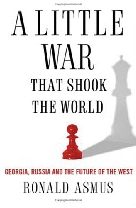
While Dr. Ronald Asmus, Director of the Brussels Office of the German Marshall Fund, and one of the author’s of the Clinton Administration’s NATO Expansion policy, was in Washington DC recently, Sldinfo had a chance to talk with Ron about his new book on the Georgian War. The book is unique in the author’s access to participants in the war and the negotiations process. Although the Russian government refused to let its representatives be interviewed for the book, Dr. Asmus pursued various avenues to discern the Russian behavior and motives in the conflict.
The book is a stern reminder of the reversibility of history, and the continued prospects for conflict in Europe that can affect the boundaries among states.The book is highly recommended: it is entitled A Little War That Shook the World and is published by Palgrave Macmillan.
Robbin Laird: So, Ron, basically you put together a very unique book looking at a crisis that most people would like to forget. This is really the first crisis of the expanded Europe and the new Russia. What’s your sense about why this crisis was so unique, and and what iss your evaluation of its impact?
Ronald Asmus: We had come to believe that war in Europe had become impossible and that we had constructed an elaborate and effective European security system that had locked in a new Cold War piece once and for all. And my thesis here is that that system failed.
That system failed to see the conflict coming. All the conflict prevention mechanisms that were supposed to identify and alert us to looming conflict didn’t work. And above all, we fudamentally underestimated the conflict between Russia and Georgia, which was first and foremost not a conflict over overAbkhazia, but a conflict over the right of a small county to choose its own path and go its own way in foreign policy. Georgia was determined to go West and Russia was determined to stop it; and Russia used those conflicts or manipulated them to provoke a war which in turn gave it the pretext to invade.
I wrote the book in part because I think, you’re right, people would prefer to sweep this under the rug and pretend it never happened, blame it all on the Georgians, which is easy to do.
But I think it raises some profound questions about why the system failed and will the system fail again because this little war not only resolved nothing, but the war aims that Russia had are still very much alive and well. The goal was not to take over Abkhazia. The goal was to break the determination of Georgia to go West and to reestablish a Russian sphere of privilege, interest, and influence on its borders, and all the seeds for another conflict are still there.
Robbin Laird: You have really followed a unique path in trying to get your sourcing for this book and have really I think done an impressive job of looking all the belligerents, all the players in this to try to get some sense of kind of the cacophony of strategic goals involved. It must have been challenging actually to sort out what eventually would shape as the truth and working the very complex sourcing for this book. It’s very impressive.
Ronald Asmus: Well, I think it’s a complicated story, which makes it hard to tell, and writing a book like this is a bit like being a Sherlock Holmes in investigative journalism. But what happens is once you start pulling on the thread of something and once it starts to unravel, then different people open up and different sources open up and I found that quite a few people weren’t willing to talk on the record.
Although, I did speak to many Russians off the record and many independent analysts. But I think it’s like a mosaic and I felt that as you put the pieces of the mosaic in place, the picture that started to emerge became increasingly clear and is different from the dominant narrative in the strategic community at the moment which is that the Georgians provoked this war. The conventional wisdom is that they had plans to re-conquer the territory and they’re to blame.
It’s a much more complicated story and one in which we too look bad. It’s too easy blame the Georgians. And what I want to do is hold up the mirror and also ask Western policymakers to think a bit about what we did wrong and how we inadvertently contributed to this movement toward war.
Robbin Laird: My final question is what is the longer-term significance of this kind of snapshot that you’ve taken of a moment in European security history? What do you think the longer-term consequences might be of the inability to really deal with this issue in a way that fully reinforces western values?
Ronald Asmus: 2010 is the 20th anniversary of the signing of Charter of Paris, and Charter of Paris was signed of course shortly after the Iron Curtain had come down, when there was a sense of a new unified democratic Europe, cooperative security. The Charter of Paris is supposed to establish a new set of rules of the game for how European security was going to function. 20 years later, there’s no longer any agreement on them.
Russia believes that we used those rules to facilitate a geopolitical moves against it. It no longer, I would argue, accepts the fundamental premises of the Charter of Paris, even though it’s signed up to them a dozen if not dozens of times over the last 20 years, and the key question now is: Do we fight for those values?
Because the Charter of Paris said “No spheres of influence, the right of countries to choose their own alliances, equal security for all countries big and small,” and we wrote them because we had concluded that the 20th Century had taught us that spheres of influence were a bag thing. They led to conflict and not to security. We wanted to move beyond them.
But it’s now all coming back. So do we acquiesce to Russian demands to legitimate a sphere of influence? Finlandization has come back as a phrase and a conflict that you hear whispered in quarters across Europe, or do we fight for or do we hold firm in somewhat up come up with a policy that tries to get the Russians to go back to those principles?
And I think that is the key question because today there is no more agreement on the rules of the game in European security. We talk the talk of cooperative security, but we’re sliding back into geopolitical competition. Institutions like NATO and EU are weak. The consensus that drove EU and NATO enlargement in the outreach to Russia is fragmenting. The OSCE is paralyzed because of the lack of agreement on what it’s all about.
So we’ve all moved on, and we’re all focused on the problems beyond Europe – Afghanistan, Pakistan, Iran, the Middle East. But I think you’re starting to see the first cracks and fissures in the foundation of European security and stability, and part of my book is a plea to focus on those and to come up with the policies to repair them before they get worse and before Europe really faces a much more serious risk of instability.
———-
***Posted March 1st, 2010


